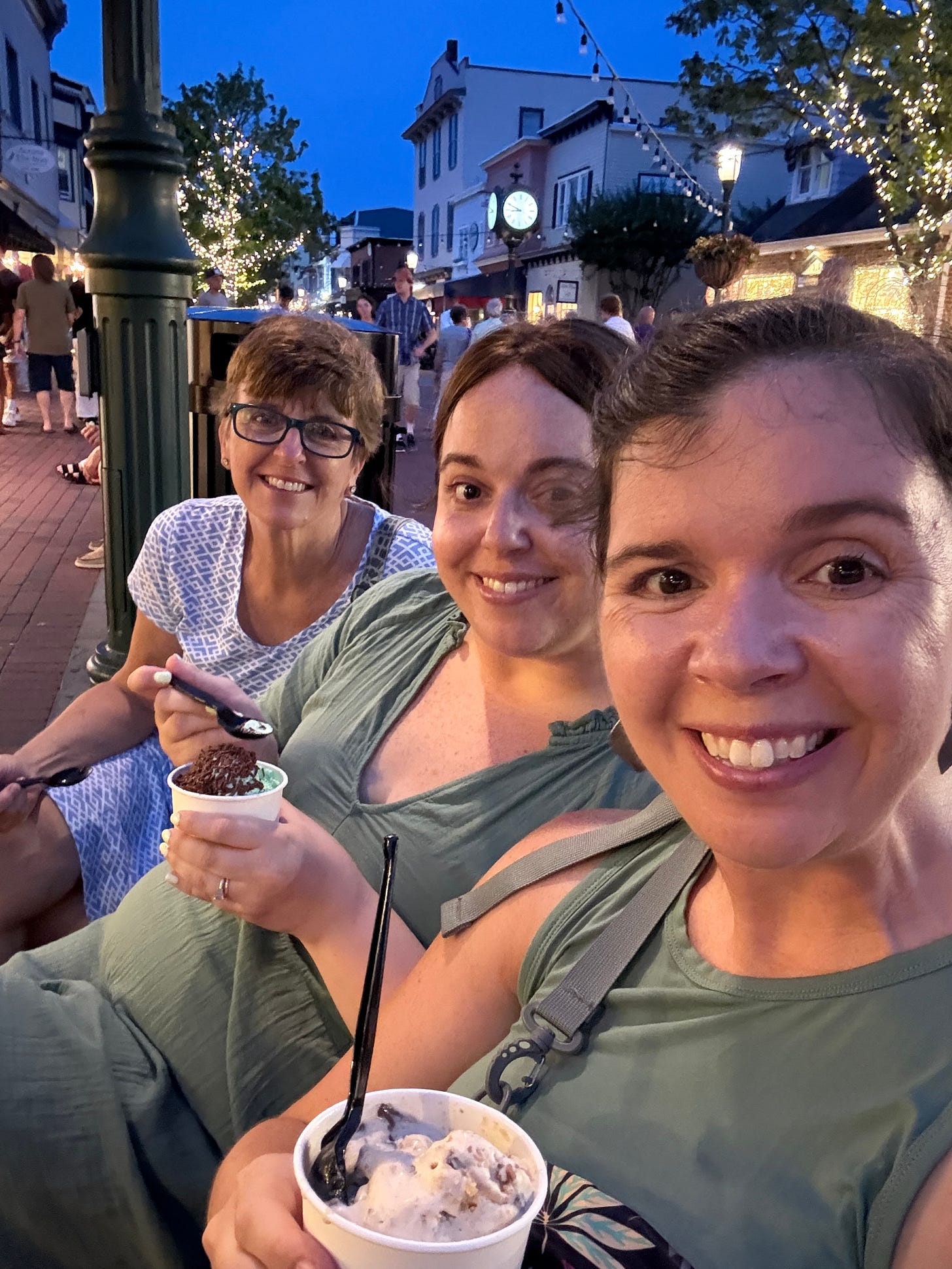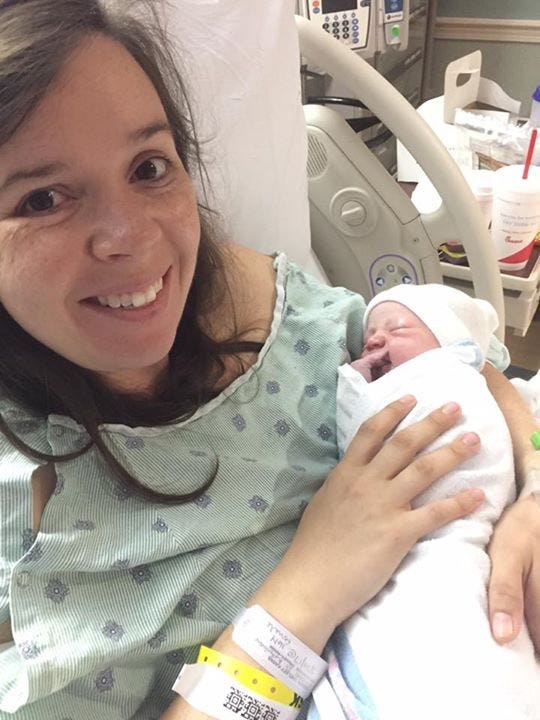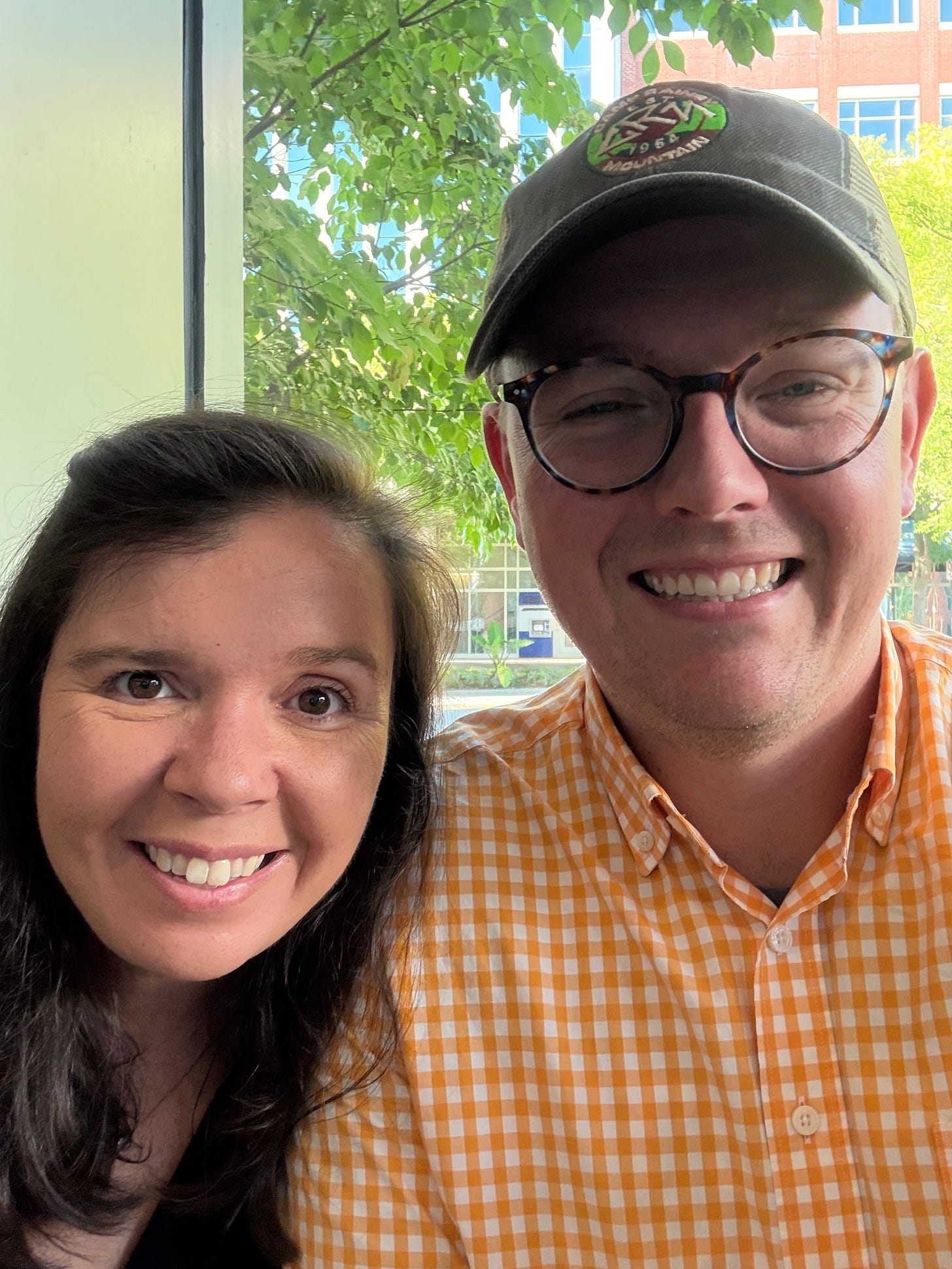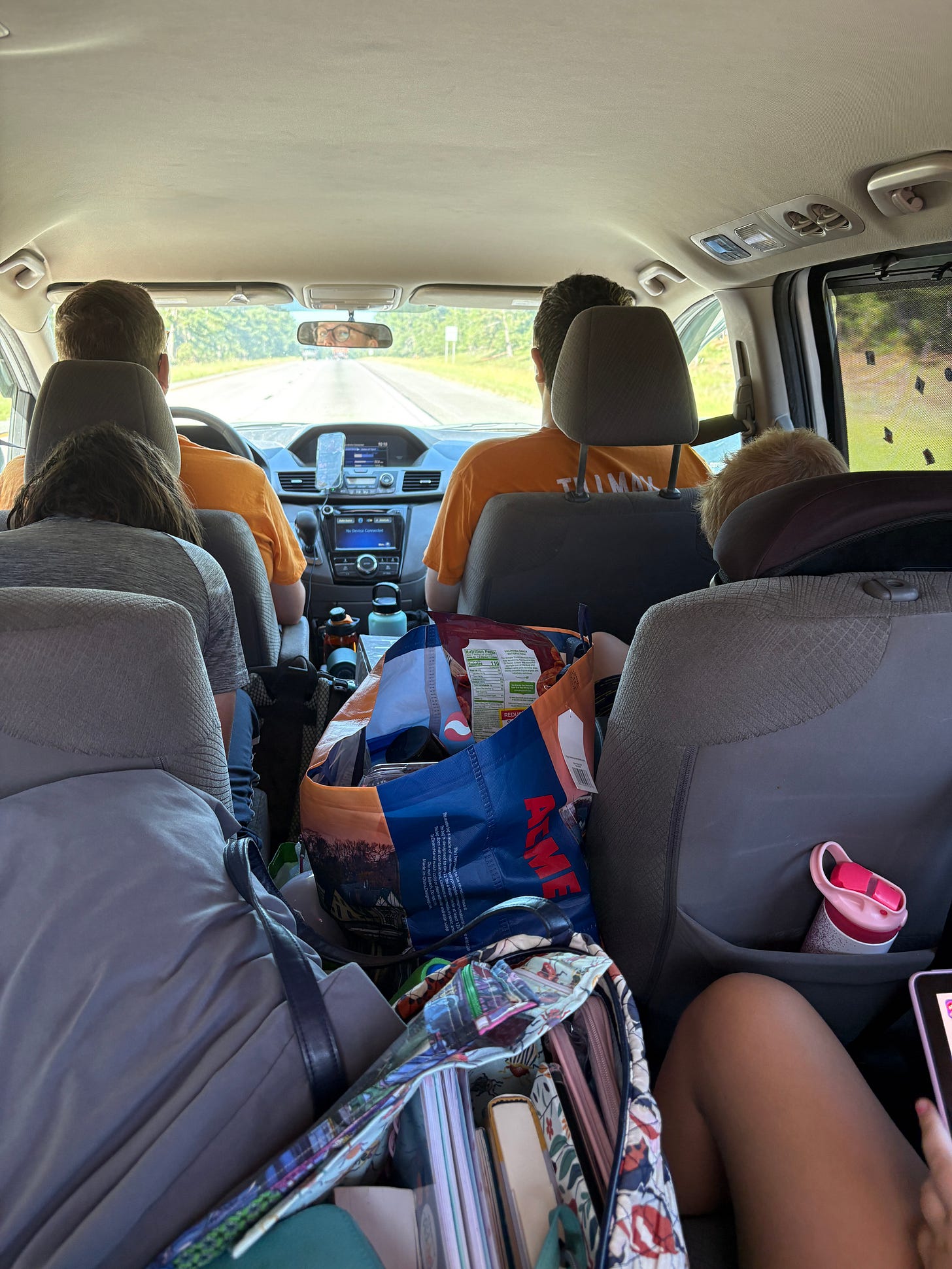Life without meds
Other than a brief bout with Lexapro in college, the first medication I took long-term was Zoloft. My OB-GYN prescribed it over the phone when I told him I couldn’t sleep and felt anxious all the time. I started immediately on a medium dose, and within a few days, I began to have pain in my jaw that led me to be unable to open my mouth all the way.
The situation that led to calling my OB-GYN had also caused insomnia, which led to me spending a night in the psych ward at the hospital. After that, I made an appointment with my PCP, who I hadn’t seen in years. With kindness and compassion, we talked through the previous month of my life and he gave me new prescriptions as well as clear guidance on how to slowly begin taking an antidepressant.
I was eventually taking 100 mg of Zoloft daily, as well as something to help me sleep as needed. I was able to stop taking the sleeping medication once the Zoloft began to kick in, thankfully without painful jaw symptoms.
I took Zoloft for almost a year. By the following summer, my husband had found a new job, and we were trying to get pregnant with our third child. I determined I didn’t want to be on Zoloft during pregnancy, so I slowly weaned off of it.
Then we had our daughter. Her birth was largely uneventful. She was a typical newborn, no more and less fussy than our boys had been. But within a week or two I had developed what the doctor later determined was a hormonal rash on my legs. At first, though, the only explanation for the rash that I could come up with was that we had bed bugs. I had bed bug technicians come to our house more than once. Even though they found no evidence of bed bugs, I asked my husband if we could sign up for bed bug insurance. I was just sure there were bed bugs, but the bed bug technicians were just really bad at finding them.
The rash did finally go away, and we never had bed bugs, although we had to keep paying for the bed bug insurance until the contract ran out (my husband has never held this over my head, bless him).
After a few months my brain seemed to recognize that my bed bug obsession was outside the range of normal and maybe I should see my doctor again. I was having a lot of low days despite having a beautiful daughter and two lovely boys. On other days, my anxiety was through the roof. I went back on Zoloft—although a lower dose this time—and stayed on it for about a year until I felt like things had leveled out.
I stopped taking Zoloft again in 2018 and didn’t approach medication again for two years. Those two years were some of the most difficult years of my life, during which I experienced bullying and abuse in the workplace as well as spiritual and emotional abuse at our church. I also got pregnant again, and then my husband lost his job and we had to move. Then came Covid.
I have already written about what the 2020 was like for me, and part of it involved going back on medication. I initially went back on Zoloft because I knew it had worked before, and I naively thought most of my issues in the summer of 2020 were just postpartum depression, failing to take into account the cumulative trauma of the previous two years. I had very little support other than my husband, I was experiencing the pandemic just like everyone else, and I was beginning to have suicidal ideations. That Zoloft was my lifeline.
After a year or so, though, while I felt somewhat better, I was still experiencing some extreme mood swings once a month that seemed related to my menstrual cycle but that were much more intense and unmanageable. For a time I wished that my family could lock me in a closet like a werewolf for three days each month, because my irritability and rage felt all-consuming, and they were the ones experiencing the worst of it.
I started seeing a new gynecologist as well as a psychiatrist, and after a lot of trial and error, we settled on a combination of two medications—Wellbutrin and Zoloft—that working together seemed to help provide general mood stability as well as relief during what I have come to call my “murder days” each month.
What I had come to realize over all my instances of taking medication for chemical issues in my brain was that medication was not the ultimate antidote. I needed to develop tools—healthy coping mechanisms—to deal with life. But for many years, without medication, I was mostly unable to access the toolbox.
Earlier this year, after almost five years on some form of antidepressant, I began to consider trying to get off the meds. My desire to do so was not influenced by anyone else; most people didn’t even know I was on anything. And even if more people had known, what I have come to realize is that most woman I know are already on something and there is very little judgment toward those taking medication.
My reason for wanting to get off of my Wellbutrin/Zoloft combo was partly curiosity. I have felt like I have grown a lot in my understanding of myself as well as recognizing unhelpful and even sinful ways that I try to deal with stress. I wanted to know if I still needed medication to be able to do it. I’ve also read multiple articles and studies about whether or not these medications are actually doing all the things we think they are. Maybe my brain could handle life without them.
I was on a very low dose of Zoloft, so low that it was not difficult to wean off of it quickly. I was also on the lowest dose of Wellbutrin, so I began by taking it every other day. After a few weeks of that, my mom came to visit, and she shared that her doctor had told her that Wellbutrin did not have the same withdrawal symptoms as other antidepressants, so it’s not necessary to follow a drawn out tapering plan, especially if you’re on the lowest dose.
While I wouldn’t recommend that anyone else in the whole world take their mom’s doctor’s advice instead of consulting with their own physician, I decided I was going to fully wean off the Wellbutrin over the next week. This just so happened to coincide with the week right before my 10-day trip with my mom, during which I’d be free of most of the obligations and stresses of normal life. This seemed like a good time to potentially be experiencing withdrawal symptoms, because I’d be able to sleep and nap and relax if I needed to.

As it turned out, there didn’t seem to be any withdrawal symptoms. If I was more tired or irritable, I didn’t experience it, probably because I was at the beach with no responsibilities. Even after I got home, though, things seemed OK. I ended up coming down with an awful cold about a week after getting home, so if any withdrawal symptoms were occurring, I couldn’t extract them from the symptoms of the virus I had.
What I didn’t say before was that before I started taking Zoloft the first time—ten years ago—I had awful anxiety whenever I was in the car and my husband was driving. I had a little bit of anxiety when other people were driving, but it was always the worst when it was my husband. What doesn’t make sense about this (like most things anxiety-related) is that my husband is not a bad driver. Nothing has ever happened to make me think I’m more likely to get in a wreck when he is driving; in fact, I’m the only one of us who has ever wrecked the car.
It had never occurred to me that my anxiety in the car with him was something that could be fixed, but then I started taking Zoloft in 2015. Within a few weeks I realized that when I was riding in the car with him, I didn’t feel like I was going to die every time he put his foot on the brakes. The reason for the Zoloft had been a traumatic life event, but the side effect of it was I could ride in the car and not feel like my brain was on red alert. For years later, riding with Christian, especially around town, was at worst a neutral experience.
In the years since then, though, I have continued to experience car anxiety when we’re doing long trips on the interstate, and the kids being in the car makes it even worse, because my brain is then worried about the potential death of six people instead of just two. A few years ago, though, I realized that if I sat in the back seat where the cars around us weren’t as visible and I was more able to distract myself, it was a lot better. We spent several years traveling with one of the boys up front with Christian, the other three kids three across in the middle, and me in the back with all the stuff.
This summer, by the time July was drawing to close, I felt pretty confident about my decision to be fully off meds, even as I noticed a difference from not being on them. I was experiencing all of my emotions more intensely. This felt hard when the emotion was sadness or anger, but I began to enjoy actually feeling joy and happiness. I didn’t realize those sensations had been numbed by the meds. There was at least one night in July when I was talking with Christian about something and when I expressed my frustration at my emotional response, he gently pointed out that it hadn’t been that long since I had stopped the meds, and it might be that I was still getting used to feeling everything more deeply. This made sense to me. I figured if this was what being off meds would be like, I could handle it.
Christian tries to take two of his weeks of vacation off at the same time in the summer. This usually happens at the end of July due to scheduling conflicts at other points in the summer. During the first week of his vacation, he and I went to Greenville together to see his favorite artist in concert. On the drive home, we were outside Augusta, GA, and it was raining, and the car in front of us slammed on its brakes. My husband had two options: run directly into the back of the car in front of us, damaging his mom’s car and almost certainly injuring us, or swerve to the right. He chose the latter, and by God’s grace, we were not hurt. The front right tire of the car, though, did not survive. We made it to a local tire shop and while our arrival home was delayed by several hours and our bank account was lowered by $160, the outcome was much better than it could have been.
Just a few days after the Greenville trip, we were getting ready to take the whole family to Tennessee for the week. We planned to leave on Monday. I usually enjoy the experience of packing, but even later into the day Sunday, I could feel myself avoiding some of the preparation. I pushed through it, because packing for six people is no small feat, but I continued to feel a sense of impending doom. I couldn’t pinpoint what it was.
I have a mental habit of what I call “scanning,” which sometimes is a pure anxiety response where I feel like I need to check in on every aspect of my life and make sure everything is OK. It’s not always helpful. But sometimes I can utilize this scanning technique to pinpoint something that’s bothering me, and I used it that Sunday night, trying to figure out which part of my life I was subconsciously freaking out about. I turned over every rock and log in my brain looking for the culprit. First I started with the usual suspects.
Forgetting something? No, I had a solid packing list and there was a Walmart nearby. Money? No, the budget for our trip was generous. Details of the trip? No, I felt fine about the AirBnB and our plans for the week felt balanced between doing stuff and doing nothing. The car ride? The alarm started going off. My brain flashed back to the moment three days before when Christian had slammed on his brakes and I had looked up to see the back of the car in front of us and thought, “We’re going to hit that car.” I took a deep breath. I reminded myself that Christian had been a good driver in scenario, and that everything had been fine.
My brain didn’t care. Now that I had uncovered the source of the anxiety, it decided to flow out freely.
I kept packing, I went to bed that night, and the next morning, there were decisions to be made about where everyone was going to sit. I knew that without a doubt, I needed to sit in the very back. I had never felt so anxious before even getting in the car, so if I felt like I did already, there was no question.
Our kids are getting bigger, so our daughter and I both sat in the back, with one big boy up front and one in the middle across from our youngest. We had stuff piled in the back and all down the middle aisle.
From our house to Tennessee, the first little bit is just on two-lane roads with a 55 mph speed limit. I was fine then, and the kids’ palpable excitement was helping distract me from the fact that we were in the car. Once we hit I-16, though, and Christian began to occasionally change lanes or break for slowing traffic, I realized that I was going to feel every single movement of the van in the depths of my soul.
I attempted to read, and I did some embroidery while listening to an audiobook, but my brain struggled to relax. Thankfully, the trip there was quick and uneventful. We stopped for lunch halfway there, and other than that, we didn’t stop at all, which was a family record. When we pulled into the driveway of the AirBnB, I stopped holding my breath.
Our week in the mountains was lovely. I felt more relaxed with my family than I had in a long time, and the anxiety-ridden car ride there felt like a distant memory. Then the last full day of our time began to draw to a close, and I felt my insides tightening up.
Not again, I thought. I scanned my brain again. Maybe I was just feeling nervous about re-entering normal life. Christian had a few more days of vacation once we were home, but the kids would be going back to school five days after we got back, so we were going to hit the ground running. It wasn’t that, though. I had all the kids’ school supplies and uniform stuff ready before we left. I had done everything I could to make the school transition easy, knowing we’d just be getting back from vacation.
It was the car ride again.
I muscled through the preparations on the morning that we left. There were tasks to do in order to check out of the AirBnB. Packing the car was much smoother because I had worked out the most efficient way to pack everything on the way there. We piled into the car.
It was only a few miles to the interstate from the AirBnB, and the car anxiety hit me likc a nuclear bomb.When we stopped for lunch a few hours later, Christian asked me what I had been up to in the back—reading, stitching? Without the kids hearing, I confessed that I had spent most of the time with my eyes closed because my brain was telling me that it would be easier to die unexpectedly than to see it coming. As we were in the car, I felt like I was in a vehicle but that there was no one in control of the car, despite very clearly being able to see my husband up front driving, and driving carefully.
The second leg of the trip was no better. The drive back took longer, too, because of the time we left and the unpredictable but presumptive traffic in Chattanooga and Atlanta. I thought about trying to read, wondering if it would trick my brain into chilling the heck out. That was a no go, so I put my headphones in and turned on first the original Broadway cast recording of Les Miserables, and once I had made it through that, I turned on the soundtrack from the more recent movie1. Mercifully, I fell asleep for a while. But by the time we arrived home, I felt like a walking ball of nerves. Despite sleeping in the car, I felt like I could sleep for several more hours. I felt safe once I was walking on solid ground in our house, but I was exhausted.
I have had another post in drafts entitled, “You don’t have to be anxious,” but I couldn’t quite figure out what I was trying to say. That post was going to be extremely nuanced, because I wasn’t going to try to tell anyone to “just trust the Lord and stop being anxious.” Honestly, I think that post would have come out looking a lot like this one, but now that I’ve been on the car ride from hell, I’d change the title. You might have to be anxious. But you don’t have to be your anxiety.
What I have learned, and am still learning, in the 10 years since I realized anxiety lived in my body, is that I can create some distance between myself and my anxiety. Just the smallest bit of distance helps. Even as my brain is screaming at me that the feeling of the car swerving is going to be the end of my life, and even as I have intrusive thoughts about the cars around us running into us, and even as I feel like something is about to go terribly wrong at any given moment, that doesn’t have to be everything. I’ve found a way to take just the tiniest step outside of that experience so that I can say to myself, You’re feeling this way and it doesn’t seem like you’re going to be able to feel any differently right now. But this won’t last forever, and you being safe isn’t dependent on whether or not you feel safe.
I cannot control, at least not yet, whether or not I feel anxious on long car rides. But I do know some things.
I know that anxiety is something I have struggled with for most of my life. I know that I am more likely to be anxious in the car, even when sitting in the back seat. I know that the near wreck the week before was still actively living in my brain. I know that I always get worried about something happening to the car when we’re on vacation, because of some experiences we’ve had on past trips. And I know that I have only been off my meds for about six weeks, after being on them for five years.
I also know that my general feeling of anxiety is influenced by any number of things. How much water I’ve had to drink. How much sleep I’ve had. Where I’m at in my menstrual cycle. My blood sugar levels. My overall sense of stress from the normal things I have to do in my life, which fluctuates on the season and the month and the week and the day.
And so, as I recover from that trip, and as I think about future long trips, one of which is less than a month away, I have been asking myself What now?

I have some options on the table before me. I could go back on meds and hope they kick in before the next car trip. I could ask my doctor about having something on hand for the car ride, something just to take that day, that might make it feel a little bit less like I’m the character riding on the back of the car in Super Mario Kart. I could do neither of these, and spend the next month absolutely dreading the trip.
I don’t think either of the first two options are wrong—they’re definitely on the table. But I don’t think the third option is inevitable just because I don’t do either of the first two. I think there might be another way.
I am not without tools, and I have all the things I’ve learned so far. I know what to expect. I expect that my anxiety is going to start showing up as the trip gets closer. I expect that the car ride there and back may be just as bad as this last one. Knowing those things, I can prepare myself, and I can make a plan:
To get a lot of cardio exercise that week, maybe even the morning we leave, before we get in the car
To get at least 8 hours of sleep in the days leading up to the trip
To make a playlist I can listen to that I know will provide some mental peace (honestly, it might be Les Miserables again)
To force myself to read or embroider regardless of how little my brain wants to in an attempt to help my brain learn that it actually cannot protect me in the car by scanning the road in front of us constantly
To pray for the Lord to give me relief (an underrated part of the plan)
To bring some protein-rich snacks that I can munch on if the anxiety gets really bad
My desire at this point is to see if some radical exposure therapy to riding in the car will help. I don’t know if it will. If it doesn’t, then I’ll think about some other options. What I am curious to see is if my distress in the car lessens. And if it doesn’t, can I grow in my tolerance of that distress?
I recently read an article that encouraged me toward this approach: What If Anxiety is a Habit, Not a Disorder?
This is not a post about how you should deal with your anxiety. I can only tell you what is working for me and how not very far I feel like I’ve come in the last ten years. I have spent a lot of time crying in the bathroom trying to relieve the tension in my body that my brain causes. I have sinned against my family and my friends in my anxiety. I have spent a lot of nights not sleeping. I have self-sabotaged my mental health in a dozen ways even as I knew those behaviors were acts of self-sabotage—and I did them anyway.
I have not reached any sort of finish line, and I don’t think one exists on this side of eternity. All I can say to you, if your brain is broken in any of the same ways mine is, is that there might be a way to find relief, and that the first step is recognizing that you are anxious but that you are not anxiety. There is a you underneath it, and that you is safe, even if you don’t feel like you are. There is something outside of anxiety, and while it is not always entirely comfortable, it is worth trying to see if you can find it.2
If you are struggling with anxiety, I’m always happy to listen and see if I can provide any help. Message me on Substack if you’re reading this in the app, or reply to this email if you get it in your inbox.
Haters may be inclined to hate, but Eddie Redmayne as Marius is a source of great joy for me.
Another post in my drafts is a list of all the resources that have helped me in my journey with anxiety, but I’m not done with it yet. One day!





You should ride to Savannah with me one day; that will make every other car ride feel safe by comparison. Just ask my wife.
Chelsey, thank you for sharing all of this! I cried at a couple different bits. I’ve been talking to a friend who is coming off medication, and it is so helpful to hear different people’s experiences. And I also want to say, I relate; I’ve sinned against my family in my frustration and stress, and I’ve self-sabotaged, knowing I would feel worse. And I haven’t heard many moms confess that. I don’t feel quite so alone now, and I thank you for sharing your story. ❤️